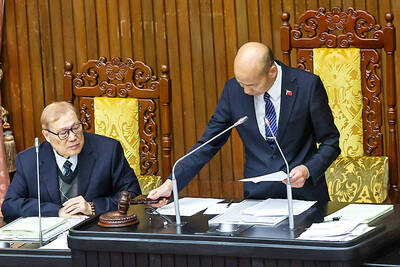Taiwan will sign the draft version of a bilateral aerospace manufacturing agreement with the US government later this month -- greatly expanding the range of aviation components and products that local firms can export to North America.
According to local media, officials from the American Institute in Taiwan (AIT) and Taiwan's representative office in Washington will sign the draft of the bilateral air safety agreement (BASA) by the end of the month, with the formal signing following late next year.
As the BASA is an official agreement signed between two governments, officials from AIT and Taiwan negotiators have been at pains to keep the negotiations low-profile so as to avoid the usual protests from Beijing, which has also signed a similar agreement with the US.
Officials from both Taiwan and the US -- who have been facilitating negotiations on behalf of the US Federal Aviation Administration (FAA) and the Taiwan Civil Aeronautic Administration (CAA) -- refused to comment on the progress of the agreement talks when sought for comment yesterday.
A BASA deal guarantees that both parties recognize each other's airworthiness certification standards and also the procedures imposed by each other's civil aviation bodies on specified aircraft products and services, according to the US FAA.
According to an informed source who spoke on condition of anonymity, Taiwan has presented its standards for locally-made cargo containers for consideration to the FAA so that these can be included in the agreement.
However, because the conditions of the agreement are flexible, Taiwan aerospace manufacturers can later expand the range of products that they are allowed export to the US, according to the source.
"There are a lot of opportunities," the source said. "The purpose of the agreement is that there is an opportunity for product expansion."
The source used Malaysia as an example -- explaining how, when the country began the BASA negotiating process, it had only applied for certification of its aircraft tires. But before the final agreement was signed it had showed the FAA that its industries could also build small, all-metal ai0rcraft weighing 5670kg or less.
"Now they are expanding to all-composite planes, showing that once you get a BASA there are opportunities for expansion," he added.
Currently Taiwan has 105 certified aerospace companies producing 582 CAA certified items.
* The bilateral air safety agreement (BASA) will greatly expand the range of aviation components and products that local firms can export to North America.
* A BASA deal guarantees that both parties recognize each other's airworthiness certification standards and also the procedures imposed by each other's civil aviation bodies on specified aircraft products and services.
Source: TT

DEFENDING DEMOCRACY: Taiwan shares the same values as those that fought in WWII, and nations must unite to halt the expansion of a new authoritarian bloc, Lai said The government yesterday held a commemoration ceremony for Victory in Europe (V-E) Day, joining the rest of the world for the first time to mark the anniversary of the end of World War II in Europe. Taiwan honoring V-E Day signifies “our growing connections with the international community,” President William Lai (賴清德) said at a reception in Taipei on the 80th anniversary of V-E Day. One of the major lessons of World War II is that “authoritarianism and aggression lead only to slaughter, tragedy and greater inequality,” Lai said. Even more importantly, the war also taught people that “those who cherish peace cannot

STEADFAST FRIEND: The bills encourage increased Taiwan-US engagement and address China’s distortion of UN Resolution 2758 to isolate Taiwan internationally The Presidential Office yesterday thanked the US House of Representatives for unanimously passing two Taiwan-related bills highlighting its solid support for Taiwan’s democracy and global participation, and for deepening bilateral relations. One of the bills, the Taiwan Assurance Implementation Act, requires the US Department of State to periodically review its guidelines for engagement with Taiwan, and report to the US Congress on the guidelines and plans to lift self-imposed limitations on US-Taiwan engagement. The other bill is the Taiwan International Solidarity Act, which clarifies that UN Resolution 2758 does not address the issue of the representation of Taiwan or its people in

The Philippines yesterday criticized a “high-risk” maneuver by a Chinese vessel near the disputed Scarborough Shoal (Huangyan Island, 黃岩島) in a rare incident involving warships from the two navies. The Scarborough Shoal — a triangular chain of reefs and rocks in the contested South China Sea — has been a flash point between the countries since China seized it from the Philippines in 2012. Taiwan also claims the shoal. Monday’s encounter took place approximately 11.8 nautical miles (22km) southeast” of the Scarborough Shoal, the Philippine military said, during ongoing US-Philippine military exercises that Beijing has criticized as destabilizing. “The Chinese frigate BN 554 was

LEISURE: The new law adds Confucius’ birthday, the anniversary of the Battle of Guningtou, Constitution Day and Little New Year as national holidays The Legislative Yuan yesterday passed new legislation adding four national holidays and making Workers’ Day a national holiday for all sectors. The Chinese Nationalist Party (KMT) and the Taiwan People’s Party used their combined majority in the legislature to push the jointly proposed draft through its third and final reading. This new law supersedes the existing regulations for the implementation of memorial days and state holidays, which are administered by the Ministry of the Interior. The new law recognizes Confucius’ birthday on Sept. 28, the anniversary of the Battle of Guningtou on Oct. 25, Constitution Day on Dec. 25 and “Little New Year,”